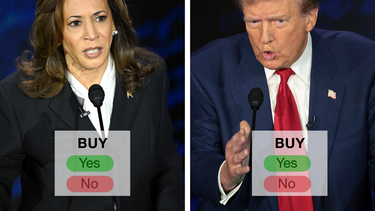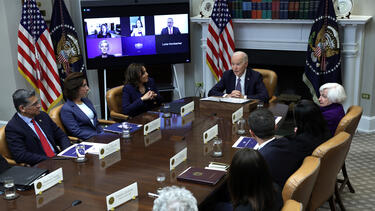Politics and Policy
The Problems with a Socialist Vision for NYC
Yale’s Jeffrey Sonnenfeld and co-authors suggest that some of New York City mayoral candidate Zohram Mamdani’s socialism-inspired proposals, such as city-owned grocery stores, are likely to run into inefficiencies and unanticipated downsides. They write that capitalism can be a better engine of progress.

Don’t Trust the Political Prediction Markets
Yale SOM’s Jeffrey Sonnenfeld, co-author Steven Tian, and investor and former White House staffer Anthony Scaramucci write that the markets have extremely low trading volume—which makes it easy to manipulate them.

Who Has the Secret to Manufacturing Success?
Both Kamala Harris and Donald Trump propose to use government clout to strengthen the U.S. manufacturing industry—though they have very different proposals for how to accomplish this goal. According to an analysis by Yale’s Jeffrey Sonnenfeld and co-authors Laura Tyson and Steven Tian, the record of the last two presidential terms shows the Harris approach to be more effective at actually delivering jobs and economic growth.

Hamas Leader Yahya Sinwar’s Death Can Bring the Middle East Closer to Peace
Yale SOM’s Jeffrey Sonnenfeld, co-author Steven Tian, and diplomat Dennis Ross write that Sinwar’s death could ultimately lead to the end of Hamas rule and the political and economic stabilization of Gaza.

Celebrating a Milestone in the Campaign to Eliminate a Major Cause of Blindness
More than two million people have lost their vision, in whole or in part, to trachoma—a preventable infection that is widespread in areas with poor sanitation. Dr. Howard Forman writes that the campaign to eradicate trachoma by 2030 has achieved an important victory: eliminating the disease as a public health problem in India.

Who Makes the Rules for the New Space Economy?
The international legal framework to oversee the growing commercial activity in space doesn’t yet exist. Gershon Hasin, a graduate of Yale Law School and an expert in international law, explains how the rules for new contexts are established, and the pitfalls with space law that we can already foresee.

Big Companies Are Not the Inflation Villain
Blaming corporate greed for rising prices is not a winning argument, write Yale SOM’s Jeffrey Sonnenfeld, economist and former presidential advisor Laura Tyson, and co-author Stephen Henriques.

Recovering from Regime Change after the Monsoon Revolution
Student protestors ousted Bangladesh’s authoritarian prime minister earlier this summer. At a Yale SOM conference, academics, policy experts, and businesspeople discussed how the country can build a more just and equitable economy.

The IMF Is Returning to Russia. No One Should Be Surprised.
The International Monetary Fund’s decision to send a delegation to Russia is only the latest pro-authoritarian move from the organization under the leadership of Kristalina Georgieva, according to Yale SOM’s Jeffrey Sonnenfeld, co-author Steven Tian, and Tymofiy Mylovanov and Nataliia Shapoval of the Kyiv School of Economics.

The Truth Beneath the Economic Misinformation
Yale SOM leadership expert Jeffrey Sonnenfeld and co-author Stephen Henriques write that in the upcoming debate, the Democratic nominee can and should argue that the economy has boomed under the Biden-Harris administration.

What Will It Take to Make Housing More Affordable?
We asked Prof. Cameron LaPoint, whose research interests include real estate and household finance, if Kamala Harris’s proposal can make a difference.
